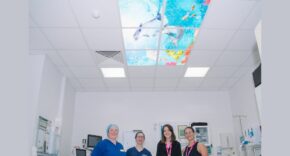
An automated patient recruitment platform (ARP) could help researchers recruit patients significantly faster into clinical studies across diverse disease areas, helping researchers identify new treatments for diseases more quickly, tech platform creator uMed says.
The UK company reports that its cloud-based patient engagement technology is able to accelerate recruitment of patients to clinical studies from months to days compared to traditional recruitment approaches, saving time for patients and clinicians.
Research suggests that as many as 86% of clinical studies fail to meet enrolment timelines; uMed says its technology opens up the possibility of faster participation and retention of patients. The traditional ‘manual’ approaches rely on the patient’s local health record and so needs a staff member to check manually each patient record. uMed says ARPs cut out this time.
In a recent application of uMed’s technology for Closed Loop Medicine (CLM), a healthcare company developing drug and digital combination products, uMed’s ARP technology enabled it to find and refer 44 patients in just three days with a referral target of 200 patients. This volume of patients in one month could take a study up to six months to recruit using traditional approaches.
Traditional methods would usually include manual invitations from GPs, practice nurses or other staff. A 2018 paper looking at patient recruitment in a Chronic Obstructive Pulmonary Disease (COPD) study found that, although GPs were reimbursed for taking part, some GP practices declined participation because of busy workloads, or did not respond, resulting in almost two thirds of patients excluded from being screened for this study.
Dr Matt Wilson, uMed’s founder and CEO, said: “Many clinical trials fail before they have even begun. Since March 2020, around 1,000 organisations supporting clinical trials have delayed the initiation of planned trials or withdrawn them completely, suspended enrolment in ongoing trials, or terminated these trials.
“Slow enrolment is largely to blame, with researchers struggling to recruit patients as volunteers. Without the volunteers to take part in clinical trials, there could be almost no research, which means it would be impossible to know which treatments are safe, let alone effective.
“A key hurdle when recruiting patients for primary care studies is the traditional ‘manual recruitment’ method still employed by many health providers in primary care. This usually involves a member of the practice staff approaching a patient based either on their ‘local’ clinical records or using the patient’s EHR data which identifies them as relevant for a particular study. In either method, the primary care team would use a standard invitation script, effectively a ‘one size fits all’ approach when engaging with the patient. This may be a disincentive for patients who do not engage so well with ‘template’ research approaches.
“Our platform seamlessly links health record data to patient engagement tools. So we can help researchers, GPs and other clinicians study across a large number of sites, and create the capacity for them to participate in many more of these studies than would otherwise be possible. The end result is that patients are highly motivated and we find very few screen failures on recruitment.”
Speedy recruitment is often critical to the success of clinical studies, making it easier for patients and primary care healthcare professionals such as GPs and family physicians to engage in clinical studies while minimising the time taken away from providing frontline care.
uMed says its platform can match cohorts of patients with clinical research opportunities while enabling the remote consent of these patients to participate on behalf of their recognised care provider. It is also able to connect with each patient’s Electronic Health Record (EHR) seamlessly and deliver automated, personalised SMS/text and digital communications throughout the clinical study.
This allows a patient’s EHR data to be securely screened enabling other remote conversations such as follow-on surveys/questionnaires sent to the patient to build up a rich data set of the health record in a data-secure way. This saves crucial time for patients, clinicians and administrative staff and enables all the participants to report directly into a secure clinical data point using pseudonymised data.
The company says its technology platform serves a global network of healthcare providers and automates the process of recruiting to studies enabling researchers to speed up the time taken to investigate a particular disease area.
The company says it is compliant across UK, European and US regions by capturing patient consent prior to any access by external research teams to health record data.












